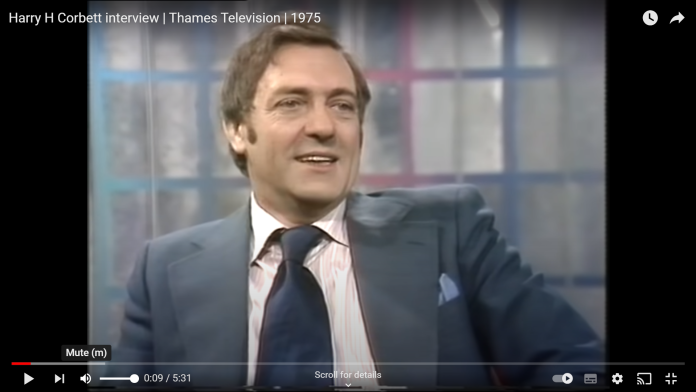
Harry H. Corbett was a British acting legend and a socialist whose career spanned over five decades, leaving an indelible mark on both stage and screen. Renowned for his versatility, charisma, and dedication to his craft, Corbett became an icon of British entertainment, beloved by audiences for his memorable performances in theatre, television, and film.
Harry H. Corbett was born on February 28, 1925, in Rangoon, Burma (now Myanmar), to British parents. His father, George Corbett, worked as an officer in the British Army, and his mother, Maude, was a nurse. Raised in Manchester, England, Corbett experienced a modest upbringing, marked by the hardships of the Great Depression and the tumult of World War II.
From a young age, Corbett harboured a passion for performance, finding solace and joy in acting. Despite facing financial constraints, he pursued his theatrical ambitions with unwavering determination, honing his skills through local productions and amateur dramatics. His early exposure to the stage instilled in him a deep-seated love for the performing arts, laying the foundation for his future success as an actor.
Corbett’s journey in the theater began in the late 1940s, as he embarked on a quest to establish himself as a professional actor. He trained at the Royal Academy of Dramatic Art (RADA), where he refined his craft and developed his distinctive acting style. Armed with newfound confidence and talent, Corbett made his stage debut in various repertory theatres across the country, earning critical acclaim for his performances in classical and contemporary plays.
In 1956, Corbett’s career received a significant boost when he landed the role of Harold Steptoe in the iconic BBC sitcom, “Steptoe and Son.” The series, created by Ray Galton and Alan Simpson, revolved around the tumultuous relationship between a father and son who ran a rag-and-bone business in London. Corbett’s portrayal of the long-suffering son, Harold, struck a chord with audiences, showcasing his impeccable comedic timing, emotional depth, and range as an actor. “Steptoe and Son” became a cultural phenomenon, catapulting Corbett to national stardom and cementing his status as a household name.
Beyond his acclaimed role in “Steptoe and Son,” Corbett enjoyed a prolific career in television and film, appearing in a diverse array of productions that showcased his versatility as a performer. He starred in numerous TV dramas, comedies, and variety shows, captivating viewers with his magnetic presence and nuanced portrayals.
In addition to his television work, Corbett ventured into the world of cinema, delivering memorable performances in films such as “Carry On Screaming!” (1966), “The Bargee” (1964), and “Carry On Regardless” (1961). His cinematic endeavors further solidified his reputation as a versatile actor capable of excelling in various genres.
Despite his professional success, Corbett’s personal life was marked by periods of adversity and turmoil. He struggled with the pressures of fame, grappling with the expectations placed upon him as a public figure. Moreover, his relationships and marriages faced scrutiny from the media, adding a layer of complexity to his private life.
One of the most challenging aspects of Corbett’s career was his desire to break away from the shadow of his most famous role, Harold Steptoe. Despite his efforts to diversify his acting portfolio, Corbett found himself typecast by his association with the beloved character. This typecasting proved to be a source of frustration for Corbett, who yearned to explore new artistic horizons and shed the constraints of stereotype.
Harry H. Corbett’s legacy endures as a testament to his immense talent, dedication, and impact on British entertainment. His portrayal of Harold Steptoe remains iconic, influencing generations of actors and comedians who followed in his footsteps. Moreover, Corbett’s contributions to the theatre, television, and film continue to be celebrated by audiences worldwide, ensuring his place in the pantheon of acting greats.
Harry H. Corbett passed away from a heart attack on March 21, 1982, in Hastings, East Sussex, at the age of 57. He was laid to rest in the cemetery at St Michael the Archangel church in Penhurst, East Sussex. His wife Maureen selected the inscription on his headstone, which reads, “The earth can have but earth, which is his due: My spirit is thine, the better part of me,” taken from William Shakespeare’s Sonnet 74. His political views were left-wing, and he was known to have sympathies towards the Labour Party. Throughout his life, Corbett expressed concerns about social inequalities and injustices, often aligning with progressive causes. While he wasn’t overtly vocal about his political beliefs in public, some of his actions, statements, and involvement in social issues hinted at his sympathies towards left wing ideologies.
If you like our content, join us in helping to bring reality and decency back by SUBSCRIBING to our Youtube channel: https://www.youtube.com/channel/UCQ1Ll1ylCg8U19AhNl-NoTg AND SUPPORTING US where you can: Award Winning Independent Citizen Media Needs Your Help. PLEASE SUPPORT US FOR JUST £2 A MONTH https://dorseteye.com/donate/











